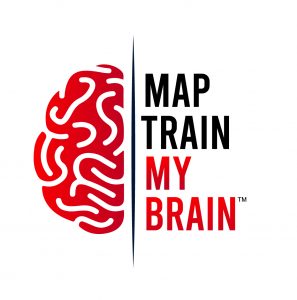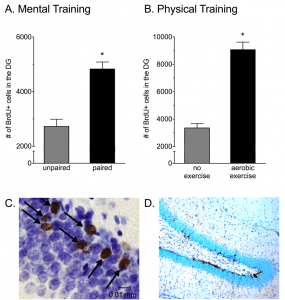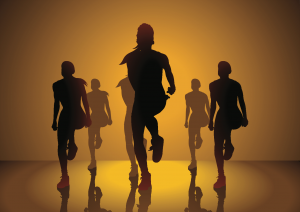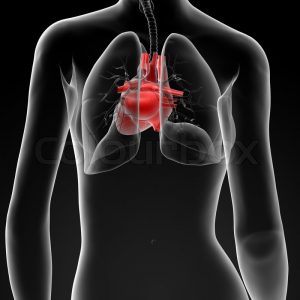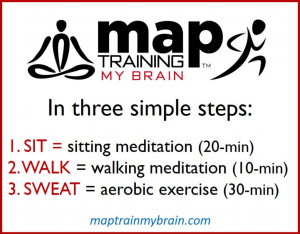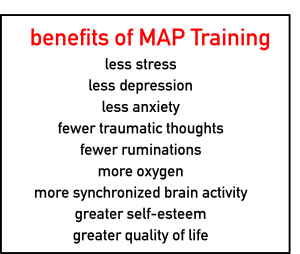MAP TRAIN MY BRAIN
Over 20 years ago, it was discovered that the mammalian brain continues to make new neurons even in adulthood – a process called neurogenesis. These neurons are made in a part of the brain used for learning – called the hippocampus. Preclinical studies done in my lab years ago discovered that mental training with effortful learning can increase the number of new neurons in the hippocampus (see Figures A and C below). Around the same time, other labs discovered that aerobic exercise can increase the number of neurons in the brain (Figures B and D). Based on these two sets of studies, I developed MAP Training, which stands for Mental and Physical Training. This program combines mental and physical exercise to increase brain fitness in humans.
The “mental” training is accomplished during meditation, which is a form of concentrated learning. The kind of meditation we do during MAP Training is a simple yet effortful practice similar to Zen and Za-zen. During each session, one learns to pay attention to one object at a time, in this case the breath. Moment by moment, one learns to pay attention, then forgets and then remembers they forgot and learns again. This type of concentrated practice trains the brain to recognize thoughts as thoughts and to let go of our attachment to them, during each session and in everyday life.
The “physical” training is accomplished during aerobic exercise. Aerobic exercise requires oxygen and gets it by increasing heart rate and therefore blood flow from the heart to the rest of the body, including the brain. We have designed a fun and engaging exercise routine that uses energetic athletic movements to high intensity modern music. However, the exercise part can be done with any kind of exercise, as long the heart beats at least 60% of its maximum for 20 of the 30 minutes. Bottom line — it does not matter what kind of exercise you do as long as you do it and you sweat!
I initially designed the MAP Training program for women who had experienced sexual trauma, in part because I have spent a lot of my career studying the female brain and how it responds to stress and knew, as we all do, that this was and is a population of people who were often ignored or forced to hide their trauma. As a result, they often do not get get the help they need in order to to live with trauma memories. In our studies, just six weeks of MAP Training reduced trauma-related thoughts in women with a history of sexual trauma. In addition to trauma, MAP Training also helps with depression. After just 8 weeks, adults with clinical depression were ~40% less depressed. MAP Training It also helps with anxiety. We did a study with women who were very anxious, having been homeless on the streets of New Jersey. After just 8 weeks of MAP Training, they were much less anxious and had greater oxygen consumption in their bodies. More details on our studies are provided below, along with links to our published scientific studies.
The great thing about MAP Training is that anyone can do it and it is portable – you can do it anywhere at anytime. To be clear, I am not saying it will replace other therapies – far from it. If you are already participating in another form of therapy, please keep at it. And simply think about adding in some MAP Training into your life. We all spend a lot of time or at least thinking about training our bodies. We should also be training our brain, keeping it fit for life. Our goal is to make MAP Training READILY accessible to human beings from all walks of life. If you want to learn or just want to help us help others, please visit MAPTRAINMYBRAIN.com
1. MAP TRAINING MY BRAIN™ FOR DEPRESSION
MAP Training helps people with major depressive disorder (MDD). After 8 weeks of MAP training, participants were less depressed. Indeed, scores on Beck Depression Inventory (BDI) decreased by 40%. Depressive symptoms were even decreased in the “healthy” controls. MAP Training was also associated with increases in synchronized brain activity during cognitive control, a sign of healthy neuronal responses to challenging training conditions. The participants were also less likely to ruminate about the past, a tendency that often occurs during depression. Together, these data indicate that MAP Training enhances mental and physical health, especially for people suffering with depression.
2. MAP TRAINING MY BRAIN™ FOR WOMEN WITH HISTORY OF SEXUAL TRAUMA
Sexual violence against women is a serious problem for society and recently there has been an awakening to the problem in modern society. Most of the emphasis has been on prevention and justice, but we must also consider the health and well-being of the survivors going forward: how can we help them learn to recover? Dr. Shors developed MAP Training specifically for this purpose and her team at Rutgers has been providing MAP Training to women who have experienced sexual violence. Afterwards, women report fewer trauma-related cognitions, less rumination and greater self-worth.
3. MAP TRAINING MY BRAIN™ FOR HOMELESS MOTHERS LIVING WITH EVERYDAY TRAUMA
MAP Training was provided to women in the community who were recently homeless, suffering untold trauma everyday on the street and beforehand. They were also all mothers. Before training, levels of anxiety and depression were very high, and physical health was poor. After only eight weeks of MAP Training, twice a week, they reported fewer depressive symptoms and many fewer symptoms of anxiety. Their physical health vastly improved with a large increase in oxygen consumption.
4. MAP TRAINING MY BRAIN™ FOR WOMEN LIVING WITH HIV
MAP Training is currently being provided for women living with HIV. Nearly 50% of people living with HIV are women but they are rarely included in clinical trials. Many of the women in our study were infected during childbirth or as children. They are taking antiviral medications but still have traumatic lives living with the stigma and the side effects of the drugs. This is an everyday trauma for them. We are excited to be able to do this and have so far been encourage by our results, including positive effects on neurocardiac function — communication between the heart and the brain. We have also found decreases in depression, perceived stress and ruminative thoughts. We are also encouraged by positive effects on cognitions.
5. MAP TRAINING MY BRAIN™ FOR MEDICAL STUDENTS
MAP Training was provided to first and second year medical students at Rutgers Behavioral and Health Sciences. Our goal was to help them deal better with the stress of medical school but also provide them with the tools and knowledge to prescribe our program to their patients when they become medical doctors. For the students, we documented decreases in ruminative thoughts and increases in their quality of life.
